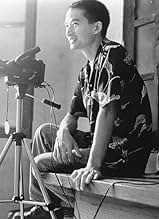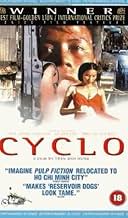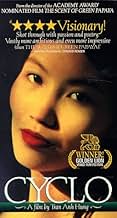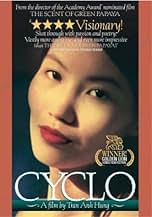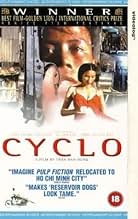AVALIAÇÃO DA IMDb
7,1/10
5,8 mil
SUA AVALIAÇÃO
Adicionar um enredo no seu idiomaWhen a poor bicycle-taxi driver has his cyclo stolen, he is forced into a life of crime. Meanwhile, his sister becomes a prostitute.When a poor bicycle-taxi driver has his cyclo stolen, he is forced into a life of crime. Meanwhile, his sister becomes a prostitute.When a poor bicycle-taxi driver has his cyclo stolen, he is forced into a life of crime. Meanwhile, his sister becomes a prostitute.
- Prêmios
- 4 vitórias e 1 indicação no total
Tony Leung Chiu-wai
- Poet
- (as Tony Chiu Wai Leung)
Nu Yên-Khê Tran
- Sister
- (as Tran Nu Yên-Khê)
Thinh Trinh
- Foot Fetishist
- (as Trinh Thinh)
Avaliações em destaque
"Cyclo" is one of the greatest independent movies ever made. Vietnamese Auteur Tran Anh Hung shows how by accident violence becomes dominant in the life of a poor, young worker toiling in the streets of Saigon. Brilliantly shot with sometimes shocking and very intimate close-ups of violence and perversion, this movie deserves more attention. Besides "Cyclo" is also a documentary about the sad daily street life in giant third world cities and the permanent fight to survive.
In Vietnam, a cyclo is both the driver of a bicycle taxi and a name given to the taxi itself. In Tran Anh Hung's 1995 film Cyclo, the cyclo driver is a naïve 18-year old (Le Van Loc) whose innocence is corrupted by the choices he is compelled to make to escape the circle of grinding poverty. Cyclo is far removed from the director's introspective and contemplative dramas (Scent of Green Papaya, Vertical Ray of the Sun) that preceded and followed it. In Cyclo, Tran assaults our senses with the churning swirl of colors and sounds of Ho Chi Minh City, capturing the vibrations of the city with its street markets, pavement cafes, sidewalk vendors, and choking traffic. He also shows the underbelly of the city: its violence, flesh for hire, and atmosphere of poverty, dirt, and decay. While the violence is graphic and unsettling, it is not exploitative and without the glamour associated with gangster films. Cyclo has little dialogue, mostly gestures and silences, and cinematographer Benoit Delhomme's focus on the underlying beauty of the city gives the film a lyricism that renders the violence ambiguous.
Cyclo has lost both parents and lives in near poverty with his grandfather (Le Kinh Huy), who continues to work fixing bicycle tires despite his failing health. His younger sister (Phan Ngoc Lieu) earns a living by shining shoes outside of restaurants and the older sister (Tran Nu Yen-Khe) works as a cook and delivery person. Cyclo's father was also a pedicab driver but was killed when he was hit by a truck. Cyclo's boss (Nguyen Nhu) is known only as the Boss Lady (none of the characters in the film are named) who leads a criminal operation while taking care of her retarded son (Bjuhoang Huy). When Cyclo's bicycle is stolen by a rival gang, the young man is recruited by the Boss lady and her associate, The Poet (Tony Leung Chiu Wai), a small-time hoodlum and pimp, to work off his debt.
The Poet is involved with robberies, sabotage, drug trafficking, and prostitution and is no stranger to homicide. He is strangely sympathetic to Cyclo, however, and seems to share with him the common longing for an absent father as revealed in the poetry he reads to him. Cyclo asks to join his gang but, in response, is forced to witness a mobster singing lullabies while he knifes a victim who is bound and gagged. Unknown to Cyclo, the Poet recruits his older sister into prostitution, making her available to men interested in various fetishes while preserving her virginity, presumably out of his own love for her. When her virginity is finally violated, The Poet tracks down and brutally murders the offending patron. Cyclo is forced to stay in an apartment away from his family and told to perform errands for the gang such as smuggling dope hidden in slaughtered cattle and throwing a gasoline firebomb into the building of the rival gang that stole his pedicab.
Tran's vision is hallucinatory and unnerving and I often found myself unable to distinguish between what is real and what is a dream. The story is told from Cyclo's perspective and we enter his mind to witness his steady descent into confusion and fear, culminating in a memorable sequence where he combines pills and liquor and drenches himself in blue paint. Cyclo is disturbing and raw but it is an original work of art, both a brutal and often bizarre look at Saigon's mean streets, and a searing love poem to the city and a young man who finally steps outside the vicious circle to discover himself beyond the chaos.
Cyclo has lost both parents and lives in near poverty with his grandfather (Le Kinh Huy), who continues to work fixing bicycle tires despite his failing health. His younger sister (Phan Ngoc Lieu) earns a living by shining shoes outside of restaurants and the older sister (Tran Nu Yen-Khe) works as a cook and delivery person. Cyclo's father was also a pedicab driver but was killed when he was hit by a truck. Cyclo's boss (Nguyen Nhu) is known only as the Boss Lady (none of the characters in the film are named) who leads a criminal operation while taking care of her retarded son (Bjuhoang Huy). When Cyclo's bicycle is stolen by a rival gang, the young man is recruited by the Boss lady and her associate, The Poet (Tony Leung Chiu Wai), a small-time hoodlum and pimp, to work off his debt.
The Poet is involved with robberies, sabotage, drug trafficking, and prostitution and is no stranger to homicide. He is strangely sympathetic to Cyclo, however, and seems to share with him the common longing for an absent father as revealed in the poetry he reads to him. Cyclo asks to join his gang but, in response, is forced to witness a mobster singing lullabies while he knifes a victim who is bound and gagged. Unknown to Cyclo, the Poet recruits his older sister into prostitution, making her available to men interested in various fetishes while preserving her virginity, presumably out of his own love for her. When her virginity is finally violated, The Poet tracks down and brutally murders the offending patron. Cyclo is forced to stay in an apartment away from his family and told to perform errands for the gang such as smuggling dope hidden in slaughtered cattle and throwing a gasoline firebomb into the building of the rival gang that stole his pedicab.
Tran's vision is hallucinatory and unnerving and I often found myself unable to distinguish between what is real and what is a dream. The story is told from Cyclo's perspective and we enter his mind to witness his steady descent into confusion and fear, culminating in a memorable sequence where he combines pills and liquor and drenches himself in blue paint. Cyclo is disturbing and raw but it is an original work of art, both a brutal and often bizarre look at Saigon's mean streets, and a searing love poem to the city and a young man who finally steps outside the vicious circle to discover himself beyond the chaos.
Another reviewer correctly pointed out this film's weakness: the script. The story starts out strong then about a third of the way through it hops the track.
After that, if you can tell what is going on and above all WHY, you're pretty good--or friends with the author.
The government of the People's Republic of Vietnam cooperated in making this film for, I suspect, political reasons. Specifically, to paint the Chinese and China in a bad light. The setting is Cholon, the Chinatown section of the old city of Saigon, the former capital of the Republic of (South) Vietnam. Saigon is now Ho Chi Minh City of course and the Chinese are almost all gone, fled from the persecution that preceded and followed the 1979 Sino-Vietnamese border war. Even in 1994 when the picture was shot relations between China and Vietnam were tense. This movie depicts Cholon as a center of drug trafficking, vice, thievery and murder in which the U.S. dollar is the most desired currency.
The camera work by Frenchman Benoit Delhomme is pure artistry. Production values are high. The leading lady Tran Nhu Yen-Khe is absolutely riveting--her exotic beauty the best thing by far about the picture. There are some interesting backgrounds, particularly a short interlude where Poet, played by Hong Kong actor Tony Leung, and Sister (Ms. Yen-Khe) escape the filthy and impoverished inner city and spend a day in the countryside. It is no accident I am sure that some of the French architecture that still stands is featured.
The minor roles are convincingly played, the characters sharply defined for all their brief appearances. It is at the center that the film's weaknesses are most evident.
After that, if you can tell what is going on and above all WHY, you're pretty good--or friends with the author.
The government of the People's Republic of Vietnam cooperated in making this film for, I suspect, political reasons. Specifically, to paint the Chinese and China in a bad light. The setting is Cholon, the Chinatown section of the old city of Saigon, the former capital of the Republic of (South) Vietnam. Saigon is now Ho Chi Minh City of course and the Chinese are almost all gone, fled from the persecution that preceded and followed the 1979 Sino-Vietnamese border war. Even in 1994 when the picture was shot relations between China and Vietnam were tense. This movie depicts Cholon as a center of drug trafficking, vice, thievery and murder in which the U.S. dollar is the most desired currency.
The camera work by Frenchman Benoit Delhomme is pure artistry. Production values are high. The leading lady Tran Nhu Yen-Khe is absolutely riveting--her exotic beauty the best thing by far about the picture. There are some interesting backgrounds, particularly a short interlude where Poet, played by Hong Kong actor Tony Leung, and Sister (Ms. Yen-Khe) escape the filthy and impoverished inner city and spend a day in the countryside. It is no accident I am sure that some of the French architecture that still stands is featured.
The minor roles are convincingly played, the characters sharply defined for all their brief appearances. It is at the center that the film's weaknesses are most evident.
8=G=
"Cyclo" tells of an impoverished Saigon family whose son (Cyclo) turns to crime and whose daughter turns to prostitution as a matter of economic survival. A magnificent accomplishment in cinematography, there's little new to be found in the film's somewhat muddled story which is told almost exclusively with the camera as Oscar winning director Anh Hung Tran demonstrates mastery over the lens in delivering this tapestry of pictures which captures the beauty and blight of a bustling Vietnamese city. Not for everyone, "Cyclo" will play best with those who appreciate true artistry in film.
10gray4
This is an astonishing film. It captures Vietnam as it transforms from a tightly controlled communist state to a free-market economy, with the poverty, crime, overcrowding and squalor in graphic detail. It must be one of the most dramatic portraits of Third World poverty ever put on film.
The story of a young man's descent and redemption goes back to 1930s Hollywood and the Italian neo-realists. But it is transformed by its setting in a Saigon hell-hole, and by the complexity of the characters. There are no stereotypes. Even the most vicious pimps and murderers have redeeming features. And an overall theme of a father's influence on his sons is distinctively Asian. The emigre Vietnamese director Anh Hung Tran brings a cold, sharp yet loving eye to Saigon and Vietnam. One of the greatest films of the 1990s.
The story of a young man's descent and redemption goes back to 1930s Hollywood and the Italian neo-realists. But it is transformed by its setting in a Saigon hell-hole, and by the complexity of the characters. There are no stereotypes. Even the most vicious pimps and murderers have redeeming features. And an overall theme of a father's influence on his sons is distinctively Asian. The emigre Vietnamese director Anh Hung Tran brings a cold, sharp yet loving eye to Saigon and Vietnam. One of the greatest films of the 1990s.
Você sabia?
- CuriosidadesMade and banned in Vietnam. Criticised as too 'westernised' in its gritty and unrelenting portrayal of urban poverty in the country. The film has nevertheless received international acclaim, winning the Golden Lion Award in Venice in 1995.
- ConexõesReferenced in Romance no Parque (1998)
- Trilhas sonorasCreep
Written by Albert Hammond, Mike Hazlewood, Thom Yorke, Jonny Greenwood, Colin Greenwood, Ed O'Brien and Phil Selway
Performed by Radiohead
Principais escolhas
Faça login para avaliar e ver a lista de recomendações personalizadas
- How long is Cyclo?Fornecido pela Alexa
Detalhes
- Data de lançamento
- Países de origem
- Central de atendimento oficial
- Idioma
- Também conhecido como
- O Ciclista
- Locações de filme
- Empresas de produção
- Consulte mais créditos da empresa na IMDbPro
Bilheteria
- Faturamento bruto nos EUA e Canadá
- US$ 284.692
- Fim de semana de estreia nos EUA e Canadá
- US$ 38.109
- 4 de ago. de 1996
- Faturamento bruto mundial
- US$ 284.692
Contribua para esta página
Sugerir uma alteração ou adicionar conteúdo ausente


